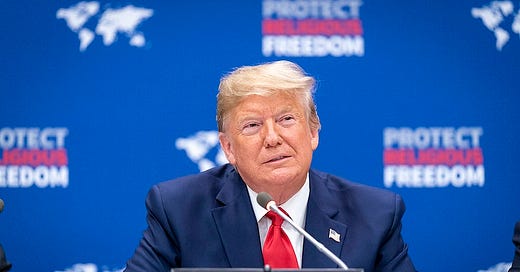There’s been a lot written about just why Donald Trump is so popular among white evangelical Christians. There are legitimate reasons for this popularity, but those have shifted somewhat since 2016.
Trump got 76% of the white evangelical vote in 2020, slightly down from the 81% he pulled in 2016. To a large extent, this is simply a party story. The Republican presidential nominee has been pulling in the mid to high 70s among white evangelicals for decades, and it doesn’t have much to do with who the nominee is. Mitt Romney, a Mormon, did as well as Methodist George W. Bush.
But Trump still presents something of a puzzle. Some of the same religious figures who wanted Bill Clinton driven from office for failing to uphold his Christian obligations have been happy to turn a blind eye to Donald Trump’s own infidelities, his fairly recent support of abortion, and his lack of familiarity with the faith. How has he not alienated them?
I wanted to share some material from my recent visit to Iowa, where I attended the Faith & Freedom Coalition kick-off event. Since it was a gathering of several presidential candidates, and organizers wanted all invitees to feel welcome, very few people explicitly endorsed Trump, although his video garnered some of the most enthusiastic responses. And other speakers citing some of his achievements in office got similar applause.
The key takeaway I got was not that evangelicals view Trump’s faith as sincere or that they’ve forgiven his transgressions or they believe God uses flawed people or anything of that sort. Rather, they view Trump in transactional terms — he makes promises to them because he wants their votes, and he delivers better than most other would-be Republicans leaders do.
One attendee shared a story with me about an Iowa pastor who met with Trump in 2015 (the story was detailed here). To try to win his endorsement, Trump asked the pastor if there was anything he wanted. The pastor said yes, he wanted Trump to bring attention to the plight of Pastor Saeed Abedini, who had been held prisoner in Iran since 2012. Trump agreed, speaking about Abedini frequently throughout the year on TV and social media. Perhaps as a result of this pressure campaign, Abedini was released to the US as part of a prison exchange in early 2016.
For the Iowa pastor, this was plenty of evidence — not that Trump was a sincere person of faith, but that he was someone with whom one could do business. He made a promise, followed through with it, and got results. This is arguably a better “art of the deal” story than most of what’s depicted in Trump’s autobiography.
And this was very much the story of the Faith and Freedom event last month. Lots of Republicans have run for office saying they’ll get Roe v. Wade overturned, only to end up making excuses or blaming Democrats or trying to take credit for creating a “culture of life.” Trump did it, and gets a huge amount of credit for it.
Now, most likely, any Republican president serving between 2017 and 2021 would have achieved that end, although it might have looked different. (President Jeb Bush might have backed off the Kavanaugh nomination in 2018, for example, although would probably have pushed another nominee in similar good standing with the Federalist Society.) But Trump made it pretty clear — Regardless of what you think of me, I will make this promise in order to get your support, and I will follow through with it.
Interestingly, there are some schisms on abortion among Republican activists right now. Some are content that Roe is gone and that abortion is now a state-level decision, and even want to de-emphasize it out of electability concerns, while others want to push for a national ban on abortion. Mike Pence has jumped on the national ban as a way to distinguish himself from and even criticize Trump. My impression, though, is that Trump has sufficient goodwill among the white evangelical community due to his past transactions with them and that their support for him is not up for grabs — not even from another white evangelical Christian.






"Evangelical Christian" is really just another term for "Republican" these days. It seems to be a political movement masquerading as a religious one.
Thank you. This was a really good read and cleared up something I didn't understand